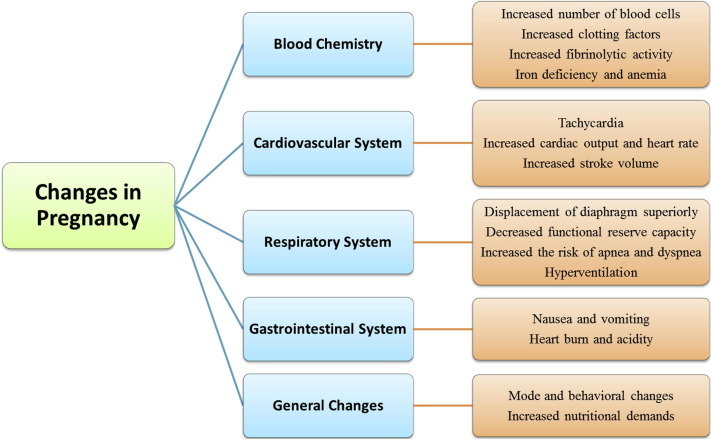
Changes that happen to Pregnant Women
There are a lot of changes to a woman’s body during pregnancy, and these changes differ from one pregnant woman to another.
These changes range from physiological changes such as changes in breast nipples and areola, changes in the vagina, pelvic,, etc, hormonal changes, emotional and psychological changes.
What does body changes during pregnancy mean exactly and what do women and those around them are expected to do or adjust to?
Morning sickness
Even though not all pregnant women experience morning sickness, it’s one of the first signs of pregnancy.
You can start having morning sickness at about 4 weeks of your pregnancy – Nausea that occurs in the morning.
Excessive vomiting during pregnancy first trimester is very common.
In your early pregnancy, you can also feel weak and have a fever in the morning without nausea.
Morning sickness is normal and healthy – studies suggest that women with morning sickness give birth to healthy children.
Also, there’s no trick to avoid morning sickness, it’s just your nature but nausea can be well managed with home remedies.
If you do not have an appetite to eat or drink and you vomit, it’s advised to consult your doctor for further help.
Adding more Weight
In the first few weeks and months of your pregnancy, you may feel fatter and fuller than before.
This impression is usually misleading – the baby bump doesn’t grow that fast either.
However, it is due to the hormones and their conversion processes that pregnant women feel fat very early on.
Water retention in the body means that they no longer fit into their old clothes as usual and everything feels tight.
Having said that, the weight of the growing baby and extra fluid in the woman’s body make a pregnant women gain weight in the third trimester.
Also, most pregnant women have more appetite to eat in the second trimester, and this contributes to more weight.
Making unusual complaints
The minor and major discomforts and pains that can arise during pregnancy vary from woman to woman.
Younger women in particular have fewer problems with back pain or water retention but can have other serious complaints of pregnancy.
The chief complaint of the pregnant women is the baby bump and back pain, and the bigger the baby bump, the greater the physical strain.
Depending on how the baby is lying down and how big it is, it may also be that its movements are sometimes uncomfortable or painful for the mother.
Some women also complain about water noises in the stomach during early pregnancy.
The pregnant woman should speak to her gynecologist about all these complaints during the preventive examinations because there is a solution for everything.
Increased Appetite
You have to eat for two now – this is the common advice given to pregnant women.
An expectant mother does not have to eat for two people, the amount of food is completely sufficient with a normal diet.
However, most pregnant women only have a low appetite for food in the first trimester, but they eat more in their second and third trimester.
While it’s good for pregnant women to eat, eating foods that are healthy for your baby is very important.
Folic acid, for example, is very important for the first 12 weeks of pregnancy and thereafter.
Calcium is also important for your baby in the first 3 months of pregnancy.
A consultation with a gynecologist at the beginning of the pregnancy can provide information about which changes to the diet are really necessary now.
Pregnant women and their whims
Satisfying a pregnant woman can be difficult sometimes, she can desire to eat 4 different kinds of foods in 5 minutes.
There are days when no one can please the expectant mother. She desires one time this minute and you provide it, then she’s no longer interested in it and requests another thing.
On other days, she’s in a good mood and gets along well with everyone and everything.
These mood swings are caused by hormones, therefore, you should be prepared for this and shouldn’t hold it against the mom-to-be if she has a bad day or there are more emotional changes during pregnancy than expected.
Nesting during pregnancy
Nesting behavior starts in the second trimester for most first-time mothers. What nesting during pregnancy means is that the mom-to-be will start interacting with the baby’s clothes, wardrobe, toys, trolley, and other materials.
Even pregnant women that have given birth before can start preparing the home for their unborn baby at 28, 30,,, or 32 weeks of pregnancy.
Nesting does not mean a sign of labor, the nesting instincts appear in the third trimester, and it’s as a result of the happiness that the fetus would soon arrive and the mom can’t wait to see her baby and live with it.
A few weeks or even months before the birth, pregnant women start preparing their home for the baby on their own.
A few days before the birth, the nest building continues intensely.
This nest-building instinct is quite normal and natural and maybe a bit inconvenient for the family and the father-to-be, but it is part of it. When the pregnant woman is ready, it also fuels the anticipation of the baby.
Craving food during Pregnancy
Weird pregnancy food cravings are also common. Craving both sweety and salty foods.
Food cravings while pregnant have nothing to do with the gender of the baby, however, pregnant women think that pregnancy cravings are what the baby wants.
Cheese, chocolate, milk are common things pregnant women crave, they also crave surgery, sweety, salty and spicy foods.
Especially in the first months of pregnancy, but sometimes also on individual days in the second and third trimester, pregnant women want very strange dishes and crave foods that do not go together at all.
They get disgusted when you offer them foods that are different from their cravings, and in the worst case, they vomit if they just smell them.
As long as the gynecologist has no objection, a pregnant woman is allowed to eat anything she wants and in whatever combination she wants.





